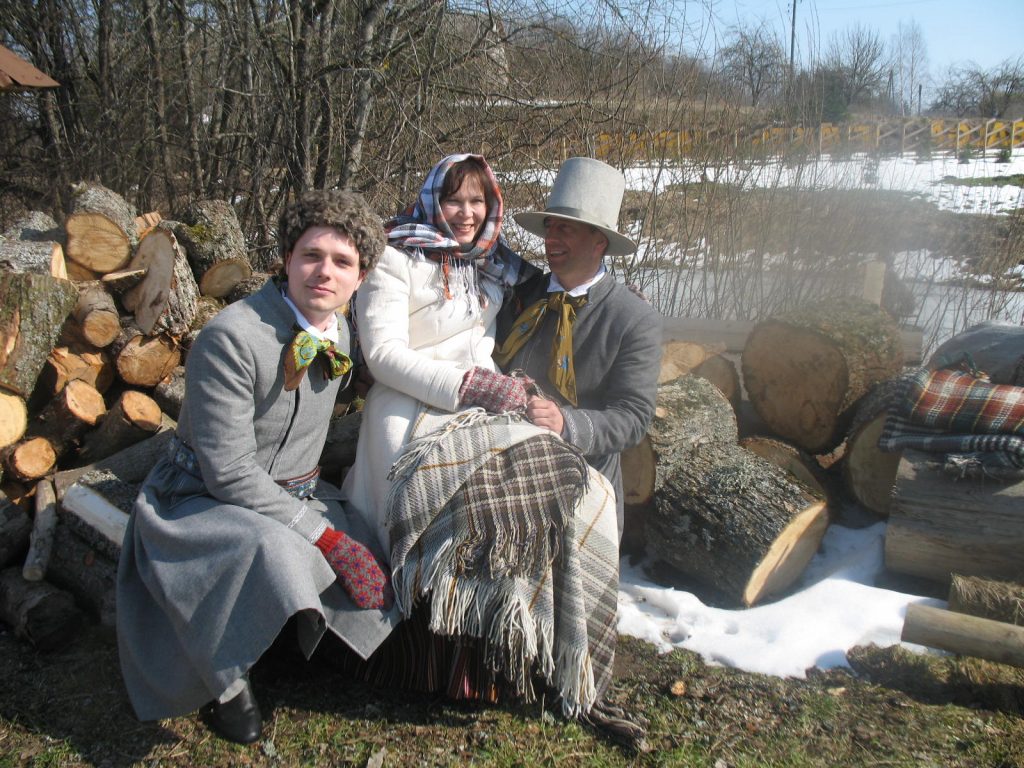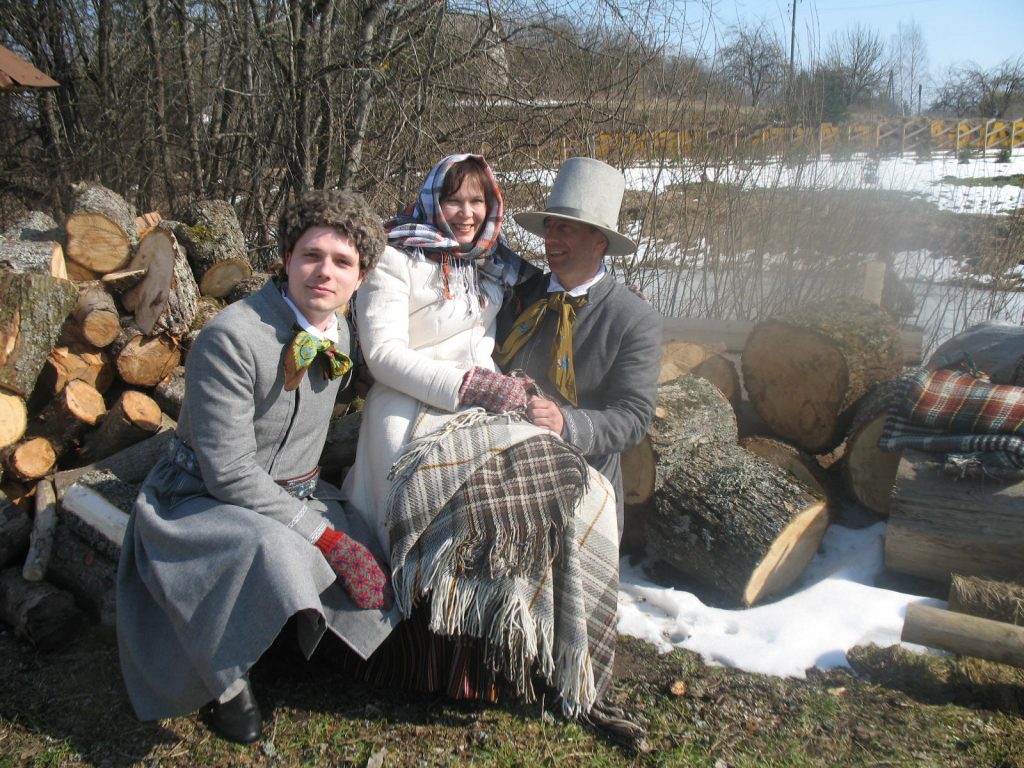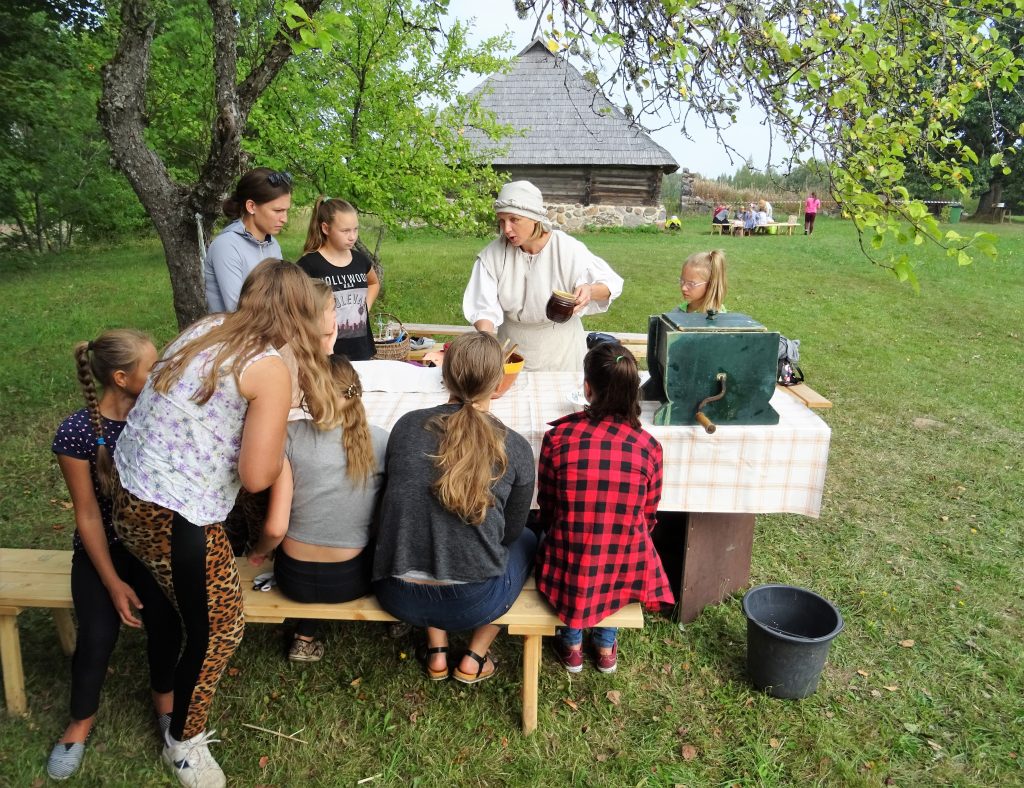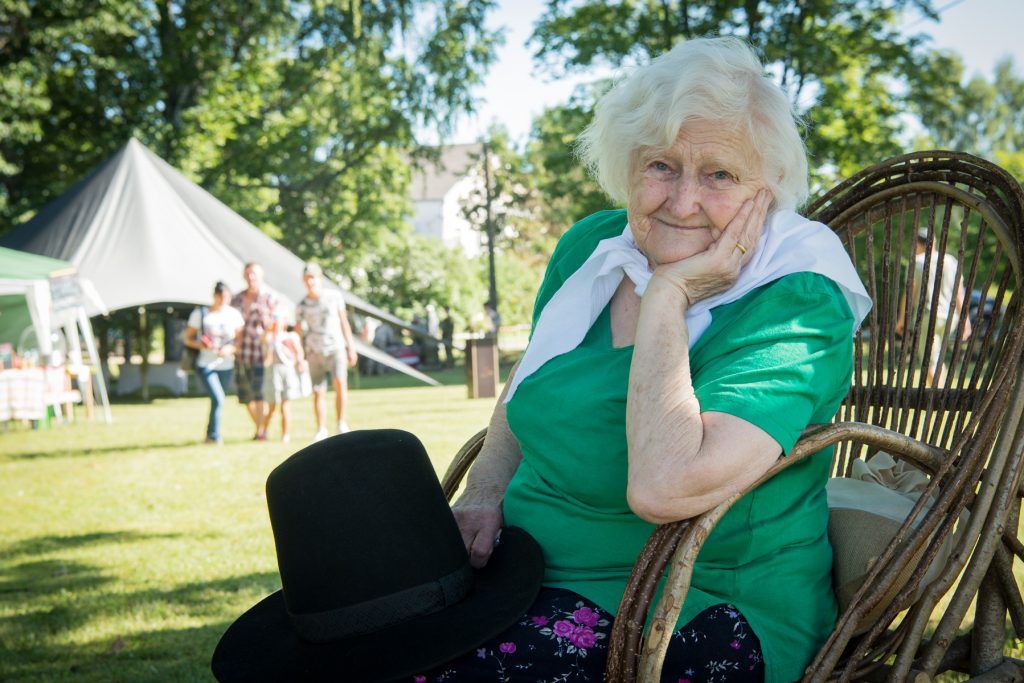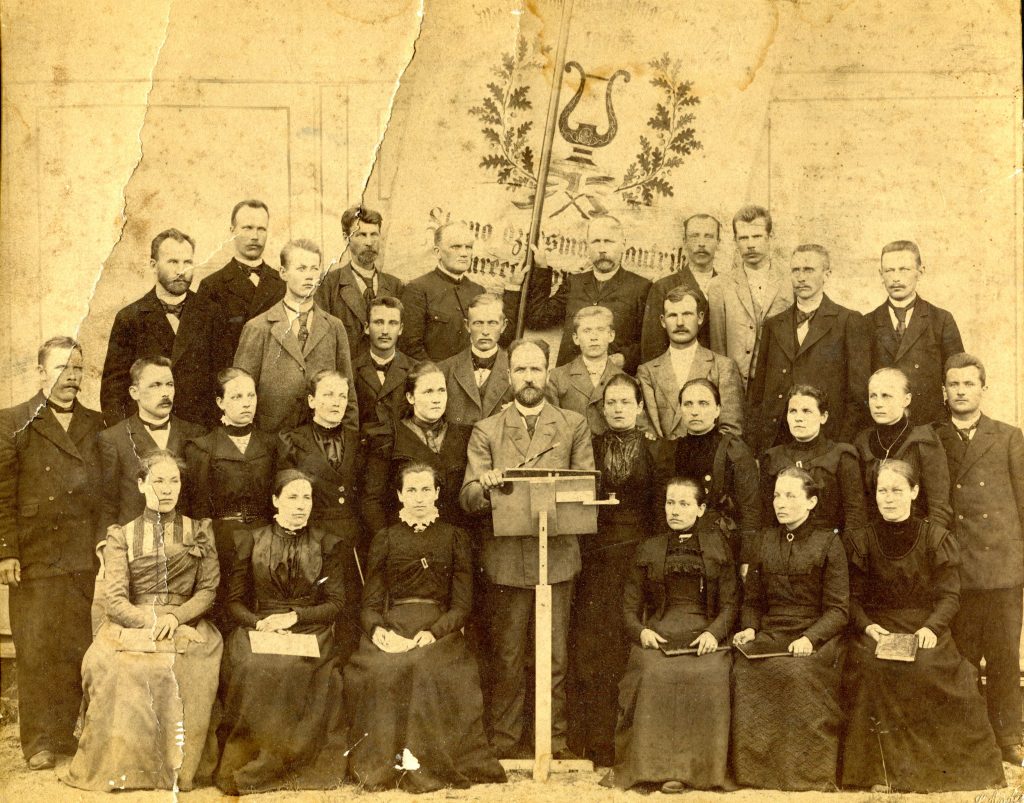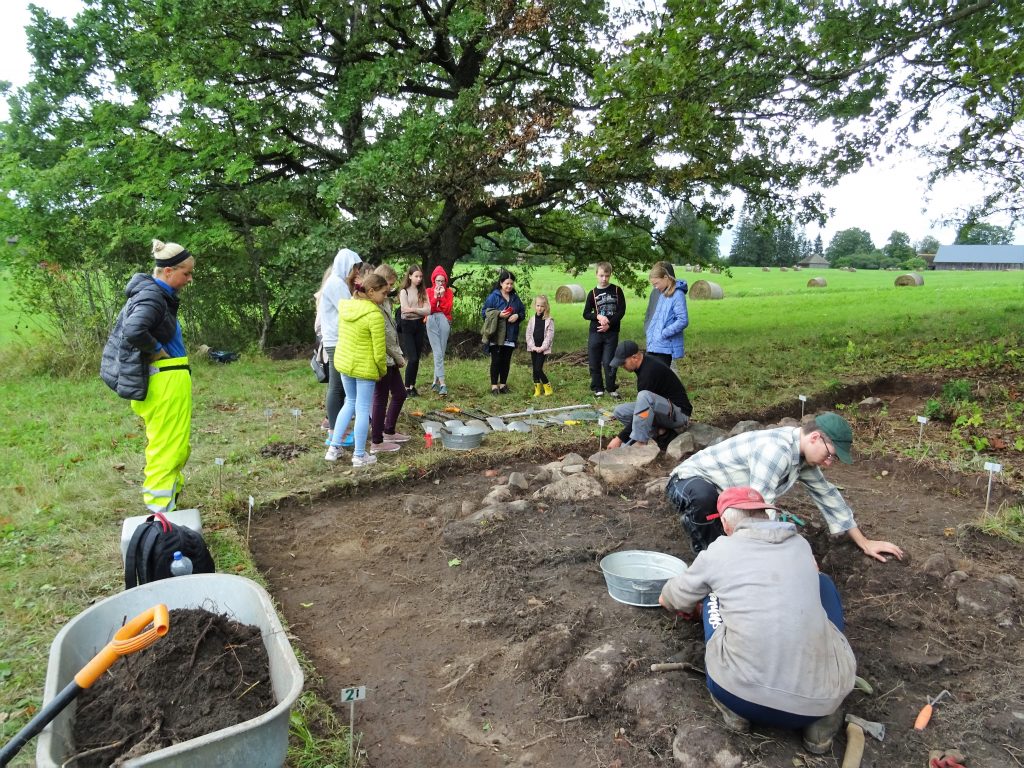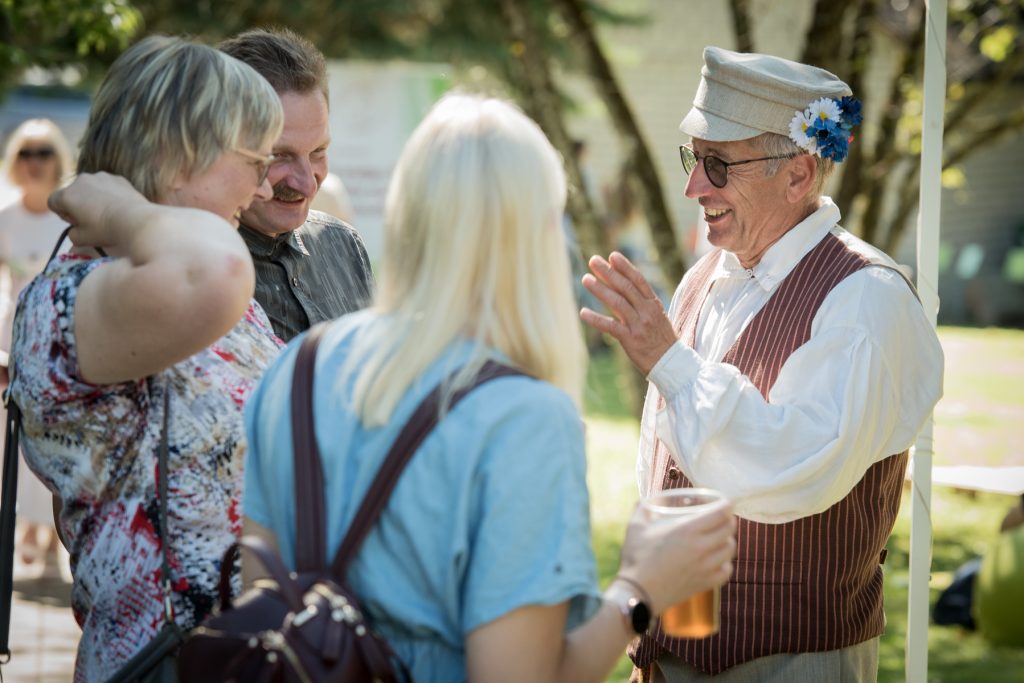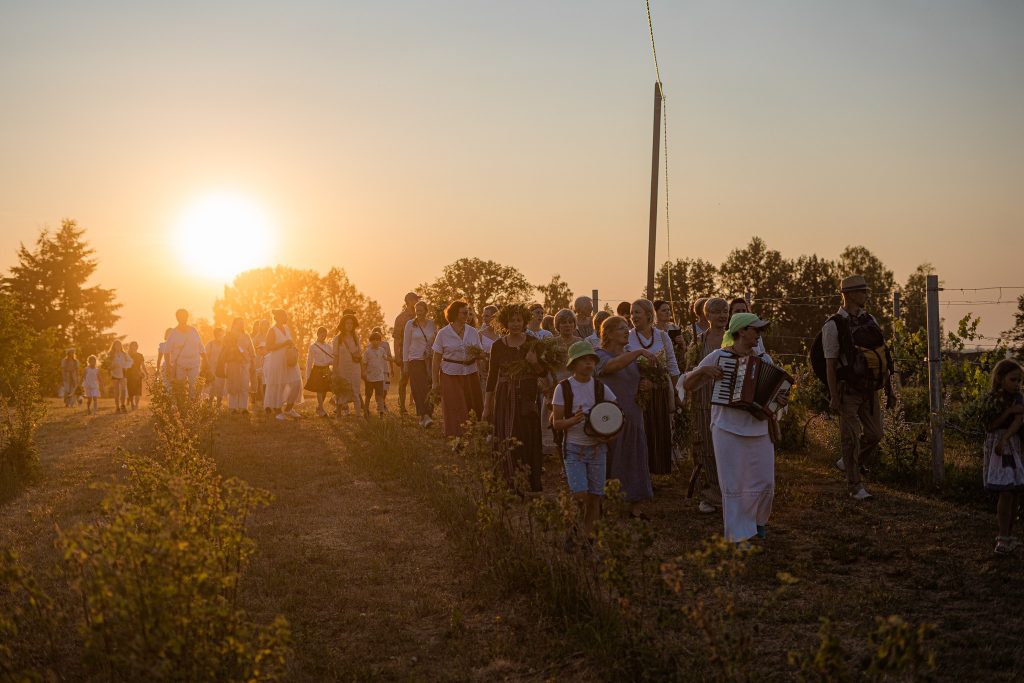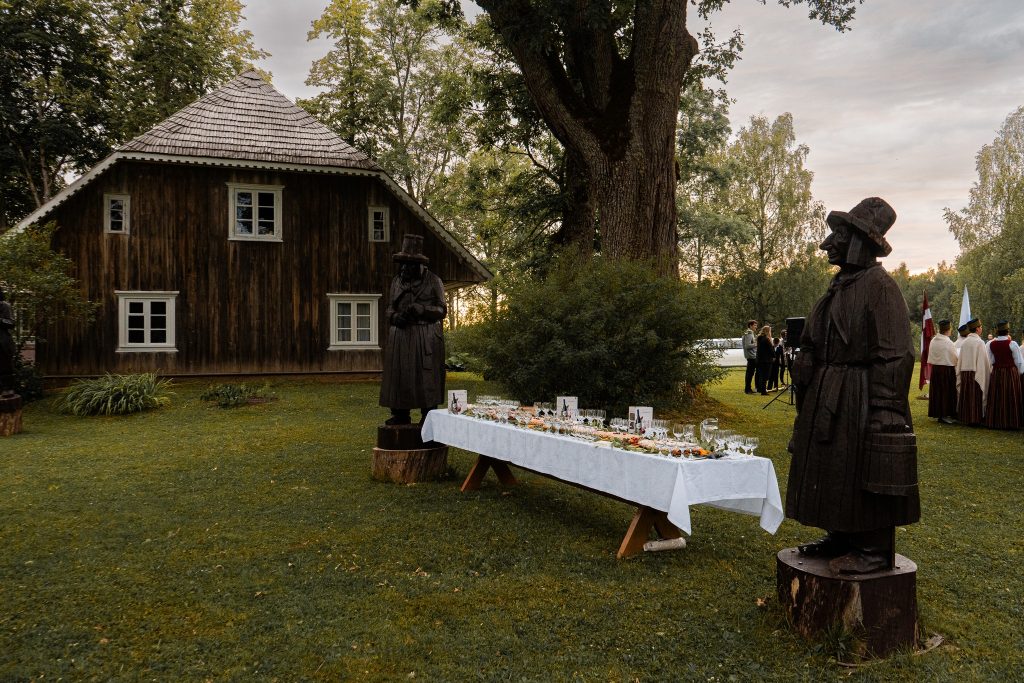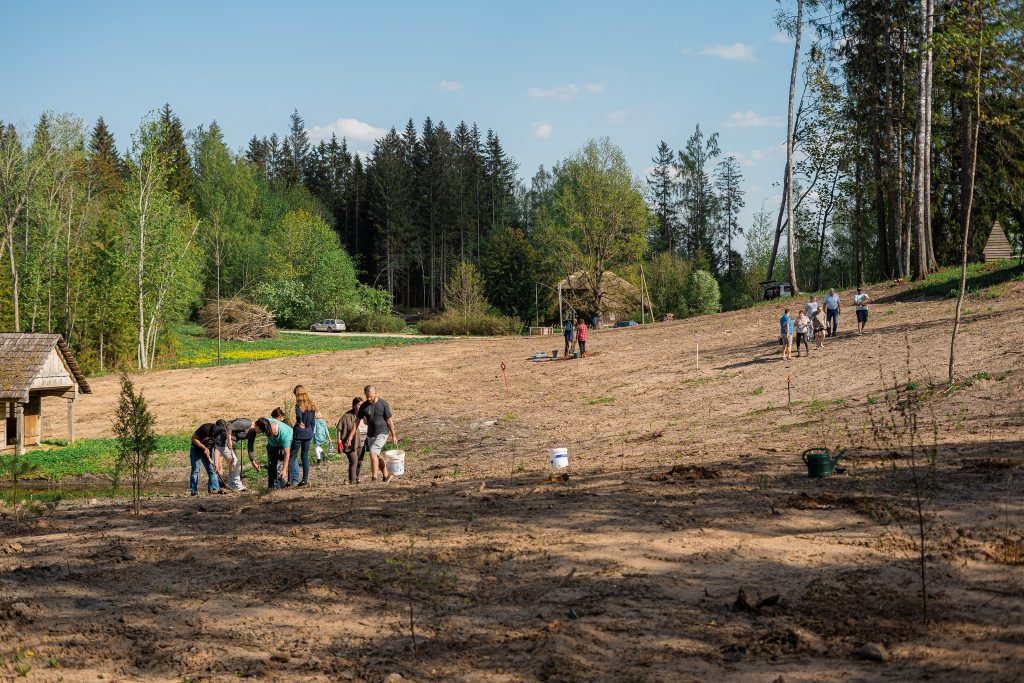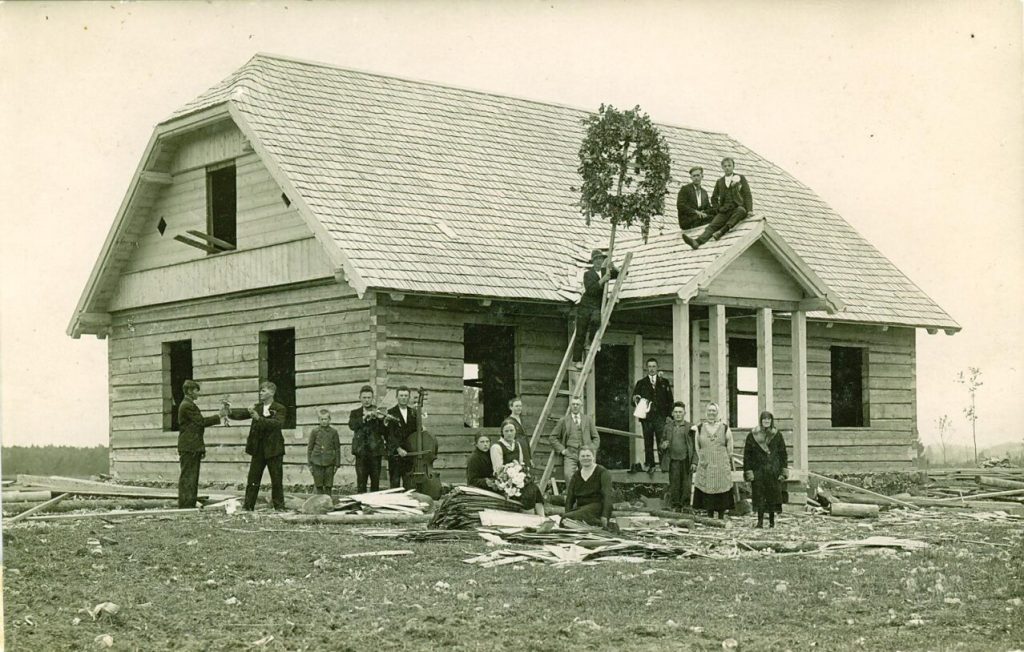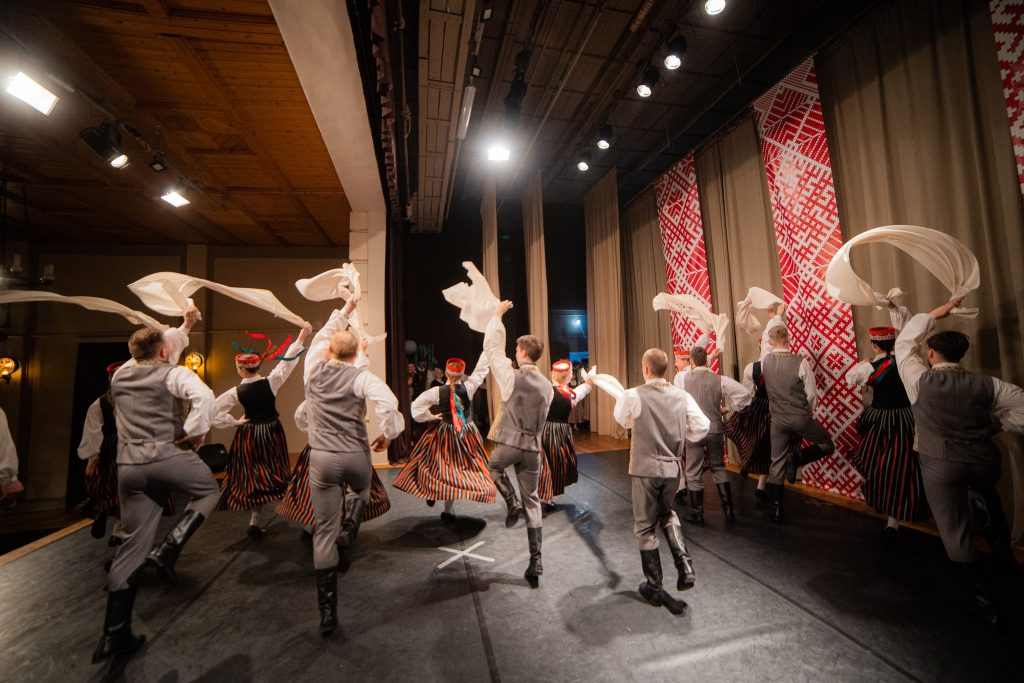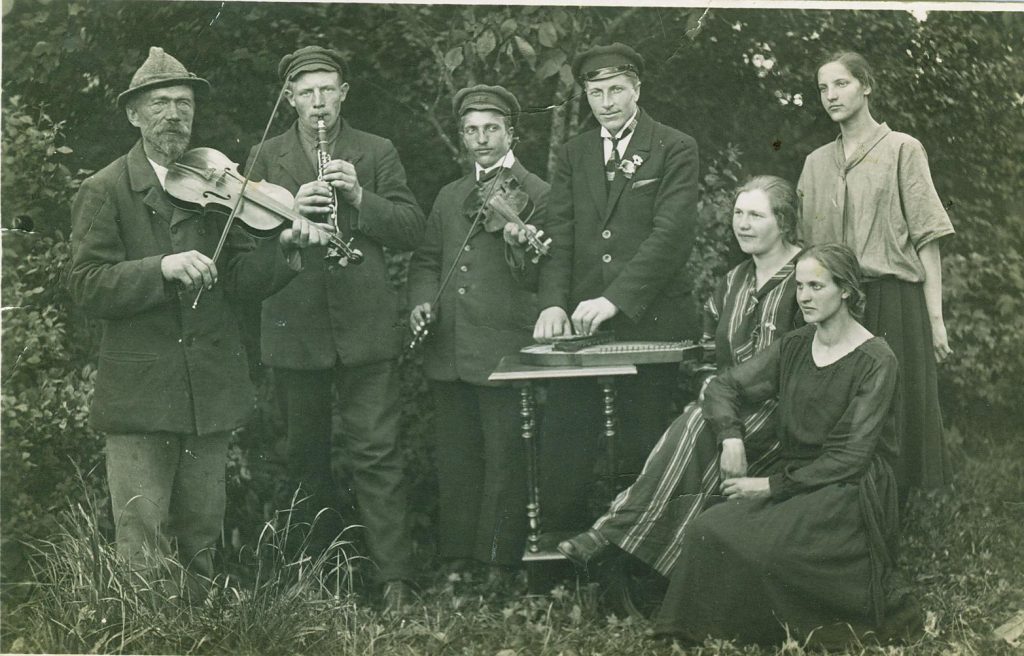Author:
Atis Eglins-Eglitis
Other domains
Oral traditions and their expressions, including language as a vehicle of intangible cultural heritage
Social practices, rituals and festive events
Music/performing arts
Traditional kitchen
Traditional craft skills
Knowledge and practices concerning nature and the universe
Title
Piebalga Cultural Space (2023)
Distribution:
Jaunpiebalga Parish, Ineši Parish, the eastern part of Kaive Parish, Vecpiebalga Parish, Zosens (Zosēni) Parish in the Cēsis Municipality.
The cultural space of Piebalga is created by just under six thousand inhabitants. The people of Piebalga have a strong sense of belonging to the place and space in which they live and which they represent. With their unique identity, shaped by the intersection of ancient skills, the characteristics of their living environment, and the need for education and knowledge, the people of Piebalga are important bearers of Latvian national identity. A distinct “Piebalga spirit”, or a proud sense of community identity, has been historically registered and emphasised in daily life, literature, art, traditions, and continues to this day.
The contemporary Piebalga cultural space community is represented by academics and scientists, cultural and public figures, educators, practitioners of traditional culture, politicians, municipality officials, entrepreneurs, youth, and other custodians and developers of cultural space traditions. The core of the Piebalga cultural space, actively maintaining and sustaining its heritage, is formed by the museum association “Orisāre”, the Latvian Ethnographic Open-Air Museum's rural exposition “Vēveri”, the Vecpiebalga, Ineši, Jaunpiebalga, and Zosēni cultural centres with their amateur performance groups, the folk applied arts studio “Piebaldzēni”, the weaving workshop “Vēverīšas” and Dagnija Kupče, Jaunpiebalga Music and Art School, Jaunpiebalga Local History Museum and Vēsma Johansone, private owners Raimonds Dombrovskis with Vanagkalns, Guntis Gailītis with the Skrāģi Tavern, the craftsman’s house “Mazrītiņi”, the Petkēvičs family and the Cinīši Antique Museum, Vecpiebalga Water Lilies and Aina Ozoliņa, among others.
Significance in community life
Piebalga cultural space (history, events, landscape, cultural traditions, language and people) is unique in the Latvian cultural environment and Cultural Canon.
The distinct and unique sense of belonging and identity (self-awareness) among the people of Piebalga, which persists to this day, notably took shape in the 19th century.
The development of the cultural space has been influenced by access to knowledge through the Moravian movement, the unique geographical positioning – the Vidzeme Highlands with its rocky soil and barren land – as well as a distinct ethnogenesis reflected in various studies.
As a result, in the second half of the 19th century, Piebalga was recognised as one of the centres of Latvian culture and national awakening, alongside Riga, Jelgava, Tērbata, Pēterpils, and Moscow.
The strong identity and sense of belonging of the modern Piebalga community is shaped by several elements, many of which are included in Latvia's Cultural Canon – the Vidzeme hillock landscape, Imants Kalniņš, whose name is closely tied to Piebalga, and notable citizens of Piebalga like Emīls Dārziņš, Kārlis Skalbe, and Kaudzīte brothers.
It is also worth noting that Emīlis Melngailis, featured in Latvia's Cultural Canon, studied at the Vecpiebalga parish school and established the first school choir there.
The core of maintaining the Piebalga cultural space and identity is the Piebalga community (communities), where very active work is being carried out.
In Jaunpiebalga and Vecpiebalga, communities of residents have formed, addressing matters relevant to them, which are related to improving their quality of life.
For example, the Vecpiebalga community publishes its own informational publication.
The Jaunpiebalga community gathers to organise joint events and initiate various changes in the work carried out by the municipality.
For example, at the last community meeting before submitting Piebalga's application for intangible cultural heritage, the issue of needing to protect the natural landscape in the upcoming municipal territory planning was raised.
In the preservation of cultural and historical heritage, a distinct community can also be identified, with active participation from the museum association “Orisāre”, the Jaunpiebalga Local History Museum, the Piebalga Local History Exhibition in Inesi, the Museum of the First Latvian Opera “Baņuta” at the Skrāģi Tavern, and the Piebalga Art Collection in Zosēni.
It is also important to highlight the contribution of Piebalga native, literary scholar Ausma Cimdiņa, in shaping and developing the Piebalga cultural space. In her latest publication, “Latvian Literary Classics as an Impulse of Critical Thinking (“Latviešu literatūras klasika kā kritiskās domāšanas impulss”, 2023), the professor analyses the Kaudzīte brothers' “The Time of the Land Surveyors” (“Mērnieku laiki”) and the Piebalga influence on Latvian literature, both during Piebalga's golden age and in contemporary poetic classics. The researcher concludes her review with the statement – “If nothing more, then in the context of Latvian literature, culture, and spiritual life, Piebalga is a unique island of spiritual vitality” (“ja ne vairāk, tad Latvijas literatūras, kultūras un dvēseles dzīves mērogos Piebalga ir viena tāda garīgās dzīvības saliņa”).
Nowadays, one of the most distinctive and visible symbols of Piebalga is the character Ķencis with a wide-brimmed tall hat from the Kaudzīte brothers' novel “The Time of the Land Surveyors”. The character of Ķencis also reflects the modern-day Piebalga identity and its unique character, which includes curiosity, care for one's land and household, and diligence. The Piebalga identity is also characterised by recognition, being at the centre of attention, and striving for perfection. At the same time, the Piebalga cultural space is still marked by the relations between the Slātava and Čangaļi communities, i.e., the relationships between Jaunpiebalga and Vecpiebalga. Although these peculiar relationships within the Community are still expressed in the fields of education and socio-economic cooperation, a strong sense of unity within the communities can be observed, as well as pride, identification with Piebalga, its representation and defence. This is also demonstrated very well in the preparation of the Piebalga cultural space application for inclusion in the Latvian Intangible Cultural Heritage List, which is characterised by teamwork, “co-ideation”, sharing, and coming together. Similarly, the collection of signatures of support in the Piebalga community reflects the unity, responsiveness, and interest of Piebalga in ensuring Piebalga's development and its place on the map of Latvia. Today, acknowleding the Piebalga cultural space helps to shape and provide meaningful content for local community activities.
Activities
Particularly noteworthy is the development of weaving and craftsmanship, which have a long-standing history in Piebalga.
At the beginning of the 20th century, almost every household had a loom, and the leading weaving masters in Piebalga were men, but the unique patterns of Piebalga were exhibited at international exhibitions in Brussels.
It should be noted that the familiar Piebalga folk costume was developed during the 19th and 20th centuries, differing from the unique depictions found in J. K. Broce's 18th-century drawings.
The distinctiveness of the Piebalga folk costume compared to other Latvian folk costumes is evident in women’s checked, striped, grey skirts, shoulder shawls (snātenītes, kučas), red headdresses, wreaths with bead stripes in the centre, jackets (pockets) and bodices, aprons, handkerchiefs, mitten patterns, and more.
However, the men’s folk costumes are distinguished by long coats (muduraiņi, krumpaiņi), mantles, fur coats, distinctive men’s fur coat pearl belts, trimpalde coats, round skirts (rumbiķīši), vests, neckcloths, wide-brimmed tall hats, men’s brimmed hats (banītes), and more.
The Piebalga dialect, which is part of the Vidzeme central sub-dialects of the Middle Latvian dialect, has been preserved to this day. Although its use is decreasing, it's still possible to encounter the use of broad “e” and “ē,” the diminutive suffix “-īt-” (“telīts”), the suffix “-īn-” (“sviestīns”, “klētīna”, “kalnīni”, “lejīni”), the suffix “-āj-” (“auzāis,” “smiltāis”), and the suffix “-ain-” (“lietains”, “sveķains”), etc. It is also noteworthy that historical place names and homestead names have been preserved in Piebalga.
Choral singing and theatre has always been important in Piebalga. The earliest records of a choir in Piebalga date back to 1824. In 1869, the “Singing and Reading Society” (“Dziedāšanas un lasīšanas biedrība”) was established, which by the following year already has 230 members, making it the largest singing society in Latvia. On 21 June 1870, the Vecpiebalga Song Festival took place. In current day, special events include choir gatherings organized by the Jaunpiebalga Culture Centre and various theatre performances held in both Jaunpiebalga and Vecpiebalga, often bringing together different amateur groups.
Various traditional dishes are particularly intriguing First, lamb prepared in different variations. Especially lamb soup, which is also described in “The Time of the Land Surveyors”. “Spēķes” – also allows for different variations but primarily – intestine soup or a dish made by grinding various offal into one meal. Historically, a notable beverage was cocoa, which served as a symbol of status.
Lesser-known dishes include “zīdenis” – barley porridge with pig's ear and snout, “skrostavnīca” or “zīlnīca” – groat and pea porridge with meat, “īlenīca” or “mugursmērs” – porridge with flour and bread croutons, “dravantīca” or “vecā putra” – porridge with potatoes, groats, and meat.
One of the skills and customs that characterises Piebalga is trade. As Matiss Kaudzite wrote, “endele” for the people of Piebalga was not only a source of livelihood but something more, as they “undertake, perform, and endure it with the awareness that they stand firm on their piece of land, affirming its great value in this way”. Trading as a means of sustenance and self-affirmation is a hallmark of the Piebalga identity. Spinning, weaving, crafting spinning wheels, and reselling goods were the main occupations of the time for the people of Piebalga. “The more workers there were in this trade, the further and further afield one had to search”.
The people of Piebalga engaged in trade not only locally but also in Kurzeme, Latgale, as well as in Estonia, Pskov, and Ostrov. Markets served not only as places to obtain or exchange goods but also as venues for community gatherings. Closely tied to trade and mobility were taverns, which were not only rest stops for travelers and their horses but also fulfilled a role in social gatherings, as reflected in “The Time of the Land Surveyors”, and cultural life.
Beliefs, rituals, and unwritten rules
There are several beliefs, rituals or unwritten rules in Piebalga. Some examples:
• One must never visit someone empty-handed and without bringing a gift. It is considered a special form of rudeness. Similarly, when leaving after a visit, guests are always given a small gift;
• The use of diminutives is considered derogatory in Piebalga. One should avoid using words in the diminutive form. This can imply disrespect, questioning of skills and knowledge.
The legends and tales of Piebalga are compiled in the publication “The Legends and Tales of Piebalga” (“Piebalgas teikas un nostāsti”, 2005), prepared by Spodra Ergarde, while the anecdotes of Piebalga are collected in the 1929 publication “Latvian Anecdotes. The People of Piebalga” (“Latvju anekdotes. Piebaldzēni”) by Pēteris Birkerts.
Inheritance and transmission
A wide variety of activities take place in the cultural space of Piebalga, which ensures the maintenance of identity, the preservation, development, and transfer of cultural-historical values in the fields of weaving, craftsmanship, choral singing, and theatre performances.
The inheritance and transfer of an element happens in different ways.
Here are the highlights of the most recent achievements by the people of Piebalga.
AMATEUR CRAFTS AND FOLKLORE GROUPS
In amateur crafts, ancient fabric patterns are studied and reconstructed. For example, the reconstruction of the large Piebalga scarf has been completed, and in 2022, an exhibition of reconstructed Piebalga folk costumes was held at the Vecpiebalga Cultural Center, which was also complemented by modern interpretations. It is important to note that the Piebalga artisans reconstruct a specific part of a garment or fabric every year – scarves, shawl blankets, tablecloths, etc. Additionally, the knitting traditions and skills of Piebalga are promoted and transferred. A knitting school operates in Vecpiebalga, and an annual sock knitting contest, “Learn to knit a sock, daughter!” (“Mācies, meitiņ, zeķi adīt!”) is held. In recent years, exhibitions of patterned mittens and various workshops have also taken place to teach, transfer, and promote craft skills.
The Piebalga folk costume gets worn at various events. It is especially honored in folk dance groups, where the pattern of the Piebalga folk costume stands out brightly. In the past decade, a tradition has also emerged of singing the Piebalga song “Brūklenājs” and performing the folk dance “Piebaldzēns” at various events in Piebalga.
Similarly, active inheritance and transmission also take place in the folk group “Piebaldzēni”, whose repertoire consists of Piebalga songs, games, and dances. In recent years, for example, Piebalga shepherd songs and carols, the daily life, duties, games, and challenges of shepherds have been researched and later used in masterclasses and concerts. The repertoire also includes dances and games from the Vidzeme Highlands.
CULTURAL EDUCATION
An important role is played by the Jaunpiebalga Music and Art School. In the music school, Piebalga folk songs are used as a form, especially in the younger classes, promoting melody recognition. The local folk song is also taught in music theory and history. Whereas annual celebrations are marked with explanations about local traditions. A significant project has been the Jaunpiebalga Music and Art School's “100 Piebalga Folk Songs”, which includes folk songs written in Piebalga in the form of notes illustrated by students from the Jaunpiebalga Music and Art School's art program. This book has now become an essential teaching resource in music lessons.
The work of the weaving workshop “Vēverīšas” and the Jaunpiebalga Applied Arts Studio is essential for preserving craft skills. In current day day, research into Piebalga patterns and the preservation of weaving traditions is carried out through different books, exhibitions, and lectures, as well as in craft studios. Similarly, patterns from the 19th and even 18th centuries can still be found during various expeditions in Piebalga, which are preserved and further researched.
The new generation has the opportunity to learn local pottery and metalworking, which has practical applications.
Young people often also engage in more in-depth research of Piebalga.
For example, a recent thesis involved the creation of a stylized Piebalga apron (bruncis).
It is also possible for adults to develop their skills in ceramics and metalworking, as well as different arts in the applied arts studio “Piebaldzēni”, which includes the transmission and explanation of local traditions.
It is important to note that historical place names and household names have been preserved in Piebalga. The household and place names, categorized by objects (fields, rivers, swamps, forests, valleys, etc.) have been analyzed and compiled by Lūcija Doniņa and Ilze Prīse in the collected works “From the Vinķi Hill to the Skrāģi Tavern” (“No Viņķu kalna līdz Skrāģu krogam”).
MUSEUM ACTIVITIES
Especially within the museum association “Orisāre”, where work with collections is conducted annually, accumulating, analyzing, and preserving evidence of the Piebalga society and its people. Based on this, regular exhibitions on Piebalga's cultural history topics are created each year. A Piebalga living room exhibition has also been created at “Birzīte” in Vecpiebalga. A new area of research is cemetery studies, which helps to uncover the forgotten people of Piebalga and their talents.
A Piebalga farmhouse and craftsmanship skills are preserved and nurtured under the auspices of the Latvian Ethnographic Open-Air Museum's rural exhibition “Vēveri”, which has a history of at least 400 years. Various masterclasses on traditional crafts are organized here, especially for young people – for example, butter churning and bread baking. In addition to the ethnographic museum, the restoration of unique heritage is also taking place elsewhere. For example, the rural farm “Vectūļi” in Vecpiebalga is open to tourists. It is an authentic peasant farm, recognized as a cultural monument of regional significance and an integral part of Latvia's cultural heritage. Another example is the farmhouse “Alitēni”, which was restored by the historic building restoration enthusiast Artūrs Šveds. “Alitēni”, built in the late 19th century, is located in Ineši.
FESTIVALS AND ANNUAL EVENTS
For example, “Choose Piebalga!” (“Izvēlies Piebalgu!”), “Vecpiebalga Opens Its Doors” (“Vecpiebalga atver durvis”), as well as the bicycle marathon “Over the Piebalga Hills” (“Pāri Piebalgas pakalniem”) and the skiing event “Around Alauksts” (“Apkārt Alaukstam”). Particularly noteworthy are various traditions, such as the still-active tradition of Midsummer (Jāņi) singing and celebrating the summer solstice, which involves walking the solstice trail while weaving authentic wreaths and singing songs, heading toward a Piebalga farmstead, where the sun is sent off and a fire ritual takes place. However, the largest and most inseparable element of the largest Piebalga festivals is the cooking and serving of lamb soup for the guests.
OUTDOOR SPACES AND SMALL ARCHITECTURAL FORMS
In Piebalga, various locations – squares, museums, and cemeteries not only feature monuments and sculptures dedicated to Piebalga's notable figures and characters, but also the stripe patterns from Piebalga's folk costume blankets and skirts are incorporated into diverse settings. This can be seen on chairs in cultural centers and schools, as well as on outdoor benches and other environmental objects.
History
The Piebalga Castle District (Latin: Prebalge) was first mentioned in historical records in the 1224 Treaty of Tālava. To date, there hasn't been an in-depth discussion among scholars about the precise location of this land.
However, considering the Balga stream, it is likely that the name originated from the area near the stream, therefore – near Balga (pie Balgas).
In the 1688 Swedish Vidzeme Plow Census, it was recorded that Piebalga Castle was no longer inhabited, and its lands were divided into two manors, later named Vecpiebalga and Jaunpiebalga (Neuhof).
During the Great Northern War in 1711, Russian Tsar Peter I granted both Piebalga manors to his general Boris Sheremetev, whose descendants retained ownership until the Agrarian Reform of 1920.
A significant cultural, educational, and socioeconomic flourishing, along with growth in craftsmanship and trade, occurred in Piebalga during the second half of the 19th century, closely tied to the Herrnhutian movement. In the 19th century, Piebalga, opposed to Valmiera in the 18th century, became one of the Herrnhutian centers, with approximately 90% of local peasants joining the Moravian Brethren movement. Thanks to better education and skills in speaking and writing, local inhabitants held good positions in the congregation, manor, administration, and some even served as court assessors. The Moravian Brethren in Piebalga gave Latvia the Kaudzīte brothers and “The TIme of the Land Surveyors” – the first novel in Latvian literature and one of the most artistically significant achievements of realism in Latvian writing.
The Herrnhutians also taught choirs to sing harmoniously and follow the melody, before this, even in choirs, each person sang as they knew how.
Historian Gvido Straube, who has studied the Moravian Brethren, notes that the beginnings of Latvian poetry were also deeply influenced by Herrnhutism, sentimental and characteristically Vidzeme-like.
In 1869, the “Singing and Reading Society” was founded, which already had 230 members within a year, making it the largest singing society in Latvia. On June 21, 1870, the Vecpiebalga Singing Festival took place. The most active singers were also the first theatre performers, “as they were already accustomed to rehearsals and public appearances”. By the spring of 1873, the people of Piebalga had organized 13 theatre performances. Almost simultaneously with Riga, the first plays by Ādolfs Alunāns were staged here. Thanks to an active choir and theatre life, the “Singing and Reading Society” became prosperous, which significantly influenced educational development in Piebalga to “prepare its youth for further studies”. The society chose Kronvalds Atis as its teacher, who played a pivotal role in shaping the cultural landscape of Piebalga.
In 1873, at the First Latvian Song Festival, the Vecpiebalga Men’s Choir, conducted by Jēkabs Kornets, won an award – the Silver Cup.
At the Second Nationwide Latvian Song Festival in 1880, the choir, now performing as the Vecpiebalga Charity Society Mixed Choir, earned another prize – the Silver Brooch.
Up to World War II, Piebalga continued to experience active cultural and social life.
In 1930, the first Piebalga district Song Festival took place, which had 15 choirs with approximately 600 singers participating.
After the war, collectivisation began, and one of the most significant administrative changes was the creation of the Ineši village in place of the Vecpiebalga Manor village, as well as the establishment of the Gaujiena district, with its centre in Jaunpiebalga.
In the 1970s and 1980s, Piebalga became a popular summer and permanent residence for intellectuals, cultural figures, and social workers. One such newcomer was Imants Kalniņš, who moved to the “Vecpaulēni” farmhouse in 1975, where he composed the operas “Spēlēju, dancoju”, “Ifigēnija Aulīda”, and the oratorio “Rīta cēliens”. In 1976, the first “Imantdienas” were held next to the E. Dārziņš Museum, which became very popular, but were banned in 1982. The tradition of “Imantdienas” was revived in 1995, and in 2023, they took place by Lake Alauksts – the Alauksts amphitheatre.
In the 1980s, an outdoor performance of “The TIme of the Land Surveyors” was staged at the Lake Alauksts amphitheatre, which became a cultural event of national significance in Latvia. The idea for the performance came from its head director Alfrēds Jaunušāns, while playwright Pauls Putniņš created a new stage version, and Imants Kalnins, who was living in Piebalga at the time, composed the musical arrangement fit for the region. Vecpiebalga’s artistic amateur groups, choirs, and dance ensembles were involved in the mass scenes.
In 1986, the Jaunpiebalga Music School (currently – Jaunpiebalga Music and Art School) was established, becoming a key cultural education centre in Piebalga, ensuring the development of its cultural space.
In 1989, the Piebalga Brewery opened, with its products receiving various awards and recognitions, and today it is a well-known brand.
In 2021, AS “Cēsu alus” acquired “Piebalgas alus,” continuing its development while respecting the brewery’s traditions.
From 1959 to 2009, Piebalga was part of the Cēsis district, but since 2021, following the administrative territorial reform, – the Cēsis municipality.
The Piebalga cultural space is an important element of contemporary Latvian culture and history.
First, the Piebalga cultural space has become a popular tourist destination.
It is home to many historical and cultural sites, for example, the Jaunpiebalga Church, the Vecpiebalga Manor, and the Piebalga museums, which provide information about the history, culture, and nature of Latvia.
Second, the Piebalga cultural space is also an important venue for cultural events. Major events include the traditional festivals “Choose Piebalga!” (“Izvēlies Piebalgu!”) and “Vecpiebalga Opens Its Doors” (“Vecpiebalga atver durvis”), which play a significant role in transferring knowledge and fostering a sense of belonging.
Third, the cultural landscape of Piebalga is an important natural site.
It has beautiful scenic views and landscape trails, which provide an opportunity to enjoy the nature of Latvia and spend time outdoors.
In conclusion, the Piebalga cultural space is an important symbol of Latvia's cultural heritage and traditions, drawing the attention of both local residents and tourists to Latvian culture and history.
Additional Information
Up to this day, this special trading skill has been preserved, which can be observed both at fairs and markets during various festivals, as well as in the form of several export-capable companies from Piebalga, which, by perfecting ancient craftsmanship and knowledge, have ensured the creation of new and innovative products. For example, the furniture manufacturer “Wenden Furniture”, the ceramics workshop “Piebalgas Porcelāns”, and the natural cosmetics producer from bee products “Apimi”, and others.
In recent years, the “Vecpiebalga Opens its Doors” festival has featured a retro bicycle ride, which highlights fashion and the introduction of new traditions and technologies.
A popular tourist destination is the Water Lilies of Vecpiebalga.
Many have heard of the Water Lily Pond in Vecpiebalga. Maintained, cared for, and nurtured by Jānis Sniedze, it has become a stop for passersby with its beautiful flowers and a place for gardeners to acquire new varieties of water lilies.
After Jānis Sniedze passed away, the work has been taken over by his daughters.
Masters
The Piebalga cultural space has a range of tradition keepers and carriers who embody the essence of Piebalga.
CRAFTSMEN:
• Cers Juris – “Pigoru darbnīca”, musical instruments (zvangas);
• Ceruse Vija – master of ethnographic gloves;
• Duļbinskis Aldis – carpenter;
• Gavars Atis – Vecpiebalga bread baker from an ancient recipe, “Veckriemeļi”;
• Jankovski family – Vecpiebalga ceramics;
• Kalniņa Kaija – Vecpiebalga bread baker;
• Kasparžaks Zigmunds – carpenter (chairs, spoons, plates);
• Koļesņikova Inita – Piebalga cake baker;
• Kupče Dagnija - weaver, weaving workshop “Vēverīšas”;
• Lieldiena Līga – knitting workshop;
• Pabērze Ilga – Piebalga cake baker;
• Pētersone Velta – master of reed weaving;
• Pirktiņa Kristīna – “Puuces Studio”, ceramist;
• Prūse Ilze – creator of the “Baltie darbi” brand, dressmaker of folk, linen costumes;
• Robežnieks Imants – master of the string instrument “kokle”, craftsmen's home “Mazrītiņi”;
• Rozenblats Oskars – applied and sculpting art studio “Piebaldzēni”, metal artist;
• Šube Marika – ceramist, “Marikas darbi”;
• Zvejniece Benita – weaver;
• Žīgure Vita – Handmade crafts, Head of the Applied and Visual Art Studio “Piebaldzēni”.
EDUCATION AND SCIENCE WORKERS:
• Ābelnieks Raitis – historian;
• Cimdiņa Ausma – Dr. philol., academic at the Latvian Academy of Sciences;
• Ērglis Andris – employee of the Krišjānis Barons Museum, expert in folklore;
• Polis Jānis – district researcher;
• Sila Aija – Education worker, Jaunpiebalga Music and Art School;
• Prīse Ilga – Researcher of Piebalga's historical names and place names;
• Žīgurs Edgars – Historian, jeweller, craftsman of dugout canoes, the rural exhibition “Vēveri” at the Latvian Ethnographic Open-Air Museum;
CULTURAL AND SOCIAL WORKERS:
• Baranovskis Ģirts – founder of the establishment “Gaujas Fonds”;
• Bišere-Valdemiere Dace – Head of the Jaunpiebalga Association Administration, manager of cultural and other projects;
• Damroze Aina – cultural worker, director of the amateur theatre “Triksteri”;
• Damroze Ieva – cultural worker, leader of folk collective “Piebaldzēni”;
• Dūrīte Ieva – cultural worker, Jaunpiebalga Cultural House;
• Frīdvalde-Andersone Ella – community worker, Piebalga District Research Museum;
• Gaile Una – cultural worker, Jaunpiebalga Cultural House;
• Gailītis Guntis – cultural worker, Museum of the First Latvian Opera “Baņuta”;
• Gončoronoka Tamāra – congregational leader of the Jaunpiebalga St. Thomas Evangelical Lutheran Church;
• Grudule Līva – cultural worker, Museum Association “Orisāre”;
• Johansone Vēsma – district researcher, Jaunpiebalga District Research Museum;
• Kārkliņa Ruta – Head of Krišjānis Barons Museum, folklore researcher;
• Kuzmane Dzintra – storyteller and portrayer of Kencis (Ķencis);
• Logina Baiba – librarian, district research;
• Pilābere Inese – director of the Vecpiebalga amateur theatre “Sumaisītis”;
• Prūse Dzidra – cultural worker, Zosēni Cultural House;
• Ruicēna Zigrīda – cultural worker, Vecpiebalga Cultural House;
• Skutāne Lāsma – cultural worker, leader of dance collective “Piebaldzēni”;
• Zariņa Egita – cultural worker, Jaunpiebalga Cultural House.
ARTISTS AND WRITERS:
• Baltputna Anna – Piebalga in paintings;
• Bauere Inguna – writer;
• Johansons Egils – painter;
• Lapiņa Inese – environmental artist and designer, creator of the brand “DUSIS”;
• Liepiņa Inese Īris – artist-knitter, “Wrapture by Inese”;
• Mājenieks Jānis – poet, event organizer;
• Mergina Līga – artist (black ceramics), organiser of the Vecpiebalga art plenaries;
• Žukovska Valda – leader of the Piebalga painters' group.
ENTREPRENEURS:
• Baloži Aiva un Jānis – business owners, candle pouring workshop “Gardenia Eco”;
• Dolmaņi Guntars un Valentīna – nature farm “Lielkrūzes”;
• Doniņa Diāna – businesswoman, LTD “3x9 zālītes”. Herbs are harvested in environmentally clean meadows and forests. Collected in accordance with the rhythm of nature and moon phases;
• Feldmane Madara, Boginska Ieva – natural cosmetics, made from bee products, LTD “ApiMI” (modern grasp of ancient traditions);
• Ozola Jolanta – creator of the brand “APJOZ”, master of acorn belts;
• Ozoliņa Aija – Vecpiebalga water lilies;
• Radziņi Ilona and Aivars – business owners, “Piebalgas medus”;
• Ronis Jānis – businessman, “Piebalgas porcelāns”;
• Sils Ainārs – metal artist and entrepreneur, Jaunpiebalga Garais krogs;
• Zārdiņš Kristaps – Master, “Piebalgas maize”.
Institutions and organizations
A number of agencies and institutions are involved in the maintenance of Piebalga's cultural space:
• Cēsis Municipality;
• Ineši Parish Vecpiebalga Manor Women's Choir;
• Ineši People's House;
• Administration of Jaunpiebalga Association;
• Jaunpiebalga folk collective “Piebaldzēni”;
• Jaunpiebalga Cultural Centre amateur theatre “Triksteri”;
• Jaunpiebalga Cultural Centre Mixed Choir “Jaunpiebalga”;
• Jaunpiebalga Cultural Centre youth dance collective “Piebaldzēni”;
• Jaunpiebalga Cultural Centre middle-aged dance collective “Piebaldzēni”;
• Jaunpiebalga Cultural Centre;
• Jaunpiebalga folk applied arts studio “Piebaldzēni”;
• Jaunpiebalga Music and Art School;
• Jaunpiebalga Local History Museum;
• Jaunpiebalga pensioners' club “Harmonija”;
• Jaunpiebalga St. Thomas Evangelical Lutheran Church;
• Jaunpiebalga secondary school;
• Kaive Parish Amateur Theatre “AkA”;
• Kaive folk applied arts group “Saulessvece”;
• Kaive People's House;
• Latvian Ethnographic Open-Air Museum's rural exposition “Vēveri”;
• Piebalga Museum Association “Orisāre”;
• Vecpiebalga Weaver's group;
• Administration of Vecpiebalga Association;
• Vecpiebalga Evangelical Lutheran Church;
• Vecpiebalga Cultural Centre Youth Dance Collective “Slātaviņa”;
• Vecpiebalga Cultural Centre Preschool Age Children's Dance Collective “Mazputniņš”;
• Vecpiebalga Cultural Centre Senior Dance Collective “Mudurainis XO”;
• Vecpiebalga Cultural Centre Woman's vocal group “Tāpēc”;
• Vecpiebalga Cultural Centre Middle-Aged Folk Dance Collective “Mudurainis”;
• Vecpiebalga Cultural Centre;
• Vecpiebalga manor;
• Vecpiebalga pensioners' club “Pīlādzītis”;
• Vecpiebalga secondary school;
• Zosēni Amateur Theatre “Intermedia”;
• Zosēni Ladies' Dance Group “Vēlais pīlādzis”;
• Zosēni Cultural Centre;
• Public benefit organization “Piebalgas kultūrtelpas biedrība”.
Consolidation:
The preservation of intangible cultural heritage and the strengthening of the Piebalga cultural space as a priority is emphasized in several municipal planning documents.
The Cēsis Municipality Sustainable Development Strategy for 2021–2035. One of the five strategic goals is a “competitive municipal identity based on creative industries, culture and tourism industries”. The strategy emphasizes that the preserved tangible and intangible cultural heritage, with its unique values, forms the foundation for a strong national self-awareness and regional identity. The municipality’s broad and diverse cultural offerings appeal to both local community residents and foreign visitors.
In addition – culture and creative industries are one of the economic specialisations and smart specialisations of the municipality, including crafts, writing, amateur collective activities, etc.
In the sustainable development strategy, the Piebalga cultural space is defined as a valuable landscape, as well as a culturally and historically significant area. Several guidelines have been set to develop this territory:
• To continue to preserve the cultural and historical values and peculiarities, maintaining their diversity, which strengthens the identity of both parishes and cities, fostering a sense of belonging;
• To maintain the transmission of intangible cultural heritage traditions to future generations, thoughtfully (and gently) using it as an authentic resource in shaping tourism offerings;
• To base tourism development on scenic values, using it as a symbol of the region’s identity to enhance its recognition, etc.
In practice, maintaining the Piebalga cultural space involves ensuring the operation of memory institutions, supporting cultural events and activities, and promoting various lifelong learning and community initiatives.
EDUCATION AND TRAINING, or, as the people of Piebalga say – LIGHT OF THE SPIRIT
The Piebalga cultural space is home to three educational institutions – the Jaunpiebalga Music and Art School, the Jaunpiebalga Secondary School, and the Vecpiebalga Secondary School, where knowledge about the cultural space is integrated into the curriculum. Jaunpiebalga Music and Art School plays a particularly significant role.
EVENTS AND FESTIVALS
Various activities support the transmission and preservation of this element. Some of them are listed below:
• Exhibition of works by the Vecpiebalga Weavers' Group in the windows of the Cultural Centre, January–February 2021;
• Project “Improving and Promoting Sock Knitting Skills in Vecpiebalga” (Projekts “Zeķu adīšanas prasmju pilnveidošana un popularizēšana Vecpiebalgā”), exhibition at the end of 2021 in the windows of the Cultural Centre – implemented by the Vecpiebalga Weavers' Group;
• Piebalga porcelain product exhibition in the windows of the Cultural Centre, May–June 2021;
• Exhibition of folk dolls by Piebalga resident Mārīte Kārkliņa, May 2021;
• Exhibition of ceramics by the applied and visual arts studio “Piebaldzēni”, May–June 2021;
• Summer solstice celebrations at Vinki Hill in Piebalga with the folklore group “Piebaldzēni”, June 2021;
• Exhibition–fair “Choose Piebalga!” August 14, 2021;
• Exhibition of mittens knit by Vita Elksne in the windows of the Cultural Centre, December 2021 –January 2022;
• Choral Gathering Event “The Most Beautiful Words” (“Paši skaistākie vārdi”), March 2022;
• Exhibition of the Large Scarves of Piebalga at Vecpiebalga Cultural Centre, April 9, 2022 (opening) – May 10, 2022;
• Painting exhibition by Piebalga resident Egils Johansons titled “Another Therapy” (“Cita terapija”) at Jaunpiebalga Cultural Centre, April 2022.
• Jaunpiebalga Cultural Centre amateur theatre performance “I Come from a Small Nation” ( “Es nāku no mazas tautas”), May 4, 2022.
• Applied and Visual Arts Studio “Piebaldzēni” exhibition “The Tree of Strength” (“Spēka koks”), May 2022.
• Exhibition “Colourful Joyfulness” (“Krāsainais sirdsprieks”) by the Piebalga painters, June 2022.
• Exhibition–competition of the Voldemārs Cīrulis Memorial Award for Latvian Folk Costumes, July 16, 2022 (opening and announcement of laureates) – August 21;
• Knitting competition “Learn, daughter, to knit a sock!” (“Mācies, meitiņ, zeķi adīt!”, traditional event of exploring, learning and popularizing the Piebalga sock knitting history and skills), July 30, 2022;
• Exhibition–fair “Choose Piebalga!” ( “Izvēlies Piebalgu!”), August 2022;
• Jaunpiebalga Art and Poetry Day, August 2022;
• Exhibition by the Applied and Visual Arts Studio “Piebaldzēni”, “Autumn Patterns” (“Rudens raksti”), November 2022;
• Jaunpiebalga amateur theatre performance, “The Matchmakers” (“Savedēji”), October 2022;
• Exhibition by Piebalga painters, “At the Turn of the Year” (“Gadu mijā”), December 2022;
• Choral gathering event, “Reunion” (“Atkalsatikšanās”), February 25, 2023;
• Dance collective gathering, “There Was Also Such an Incident” (“Bija arī tāds gadījums”), March 4, 2023;
• Exhibition “The Vidzeme Chair” (“Vidzemes krēsls”), April 2, 2023 (exhibition opening, participation in the “Meet Your Craftsman!” campaign) – May 8, 2023 (6 chairs from the exhibition were nominated for participation in the Song and Dance Festival's folk applied art exhibition “We” (“Mēs”), section “Roots” (“Saknes”);
• Works by the Vecpiebalga Weavers' Group – 30 items (tablecloths, towels, belts, mittens, large scarves) participate in the Song and Dance Festival's folk applied art exhibition.
PRACTICE AND LEARNING
The transmission of the Piebalga cultural space continues under the auspices of the Jaunpiebalga Applied and Visual Arts Studio “Piebaldzēni”, the Kaive Parish Applied Arts Collective “Saulessvece”, and the Vecpiebalga Weavers' Group, all of which play a crucial role in preserving traditional craftsmanship. It is also worth mentioning the brand/trademark “Choose Piebalga!” (“Izvēlies Piebalgu!”), awarded annually to a business or a keeper of craftsmanship. The trademark has been issued since 2013. Recent recipients include:
• 2022 – Madara Ķēniņa, natural cosmetics brand “Aroma Moon”;
• 2020 – Creative Studio “Baltie darbi”, entrepreneur Līna Stolere;
• 2019 – Kristīna Pirktiņa, “puuceStudio” – for white clay decorative dishes and interior items;
• 2018 – association “Slēpošanas un ūdenstūrisma klubs “Vanagkalns””;
• 2015 – Piebalga Smokehouse;
• 2014 – LTD “Wenden Furniture” and LTD “Piebalgas alus” (“Piebalga Beer”). Notably, beer in Piebalga is brewed using a unique open fermentation method;
KNOWLEDGE PRESERVATION
Municipal cultural and educational organisations have played a significant role in the maintenance and transfer of the Piebalga cultural space – the Museum Association “Orisāre”, the Jaunpiebalga District Research Museum, Jaunpiebalga Cultural Centre and the Applied and Visual Arts Studio “Piebaldzēni”, the Vecpiebalga Cultural Centre, the Zosēni Cultural Centre, the Ineši People's House, and the Skragi Tavern. For example, the Museum Association “Orisāre” has participated in the pilot project “Nosūtījums uz muzeju” (“Referral to the Museum”), highlighting the role of cultural heritage in promoting well-being and improving emotional health. Meanwhile, Skrāģi Tavern organises regular art and culture days, featuring meetings with local artists, artist plein air, different lectures, discussions, and concerts.
In recent years, several studies have been conducted and publications released to ensure the transfer of knowledge:
VISUAL ART, LITERATURE
• 2022 – ed. Vēsma Johansone “Life with a Photo Camera. Photographer Artūrs Dulbe” (“Dzīve ar fotokameru. Fotogrāfs Artūrs Dulbe”). Rezekne: Latgales druka;
• 2022 – Egils Johansons “Paintings” (“Gleznas”). Jaunpiebalga: Self-published by the author;
• 2020 – Jānis Mājenieks “Poetry of Slēģu Jānis for Friends and the Homeland” (“Slēģu Jāņa dzeja draugiem un dzimtenei”). [Riga]: ZTJC;
• 2015 – Egils Johansons “Near – Far” (“Tuvumā – tālumā”). [Jaunpiebalga]: Self-published by the author;
• 2011 – ed. Ausma Cimdiņa, Ojārs Lāms “The Text of Piebalga: The Brothers Kaudzīte Novel “The Time of the Land Surveyors”. Riga: Zinātne;
• 2011 – Dzidra Kuzmane “From the Brightness of the Spirit of Ķencis” (“Iz Ķenča gara gaišuma...”). [Riga]: Jumava.
ETHNOGRAPHY, ANTHROPOLOGY
• 2021 – ed. Egars Žīgurs “Latvian Ethnographic Open-Air Museum's Rural Exhibition “Vecpiebalga Vēveri”. A Guide”* (“Latvijas Etnogrāfiskā brīvdabas muzeja lauku ekspozīcija Vecpiebalgas Vēveri. Ceļvedis”). [Riga]: Latvian Ethnographic Open-Air Museum;
• 2018 – ed. Vēsma Johansone “Recorded in the Sign of Mara. Craftsmanship and Applied Arts in the Jaunpiebalga Municipality (19th to 21st Century)” (“Māras zīmē ierakstīti. Amatniecība un lietišķā māksla Jaunpiebalgas novadā (19. līdz 21. gs.)”). Jaunpiebalga Municipality;
• 2014 – Aija Jansone, Dagnija Kupče “Piebalga Is, Was, and Will Be. The Dressing Culture of Piebalga Residents in the 19th Century” (“Piebalga ir, bija un būs. Piebaldzēnu ģērbšanās kultūra 19. gadsimtā”) [Cēsis]: Weaving Workshop “Vēverīšas”;
• 2005 – Zeltīte Cēderštrēma, Ilva Duļevska. “The Lifespan, Illnesses, and Diagnoses of Vecpiebalga Residents Based on Materials from the 1936 Anthropological Expedition. Acta Medico-Historica Rigensia. VII Collection of Articles” (“Vecpiebalgas iedzīvotāju mūža ilgums, slimības un diagnozes pēc 1936. gada antropoloģiskās ekspedīcijas materiāliem. Acta medico-historica Rigensia. VII rakstu krājums”) [Riga]: Pauls Stradiņš Museum of Medical History, AML. Institute of Medical History.
NATURE
• 2021. gads – K. A. Konkovs. Lake Management in the Piebalga Region: Climate, Nature and Culture from the 1890s to now. Yearbook of Balkan and Baltic Studies;
• 2018 – Juris Zaķis “At the Sources of Gauja” (“Pie Gaujas iztekām”) – [Gulbene]: Vītols Publishing House.
ORAL FOLKLORE
• 2022 – Gatis Ozoliņš. “Kaive Stories”. Riga: Jumava;
• 2020 – ed. Aija Sila, “100 Folk Songs from Piebalga” (“100 Piebalgas tautasdziesmas”). – [Jaunpiebalga Municipality]: Jaunpiebalga School of Music and Art;
• 1929 – Peteris Birkerts, “Latvian Folk Anecdotes. The People of Piebalga” (“Latvju tautas anekdotes. Piebaldzēni”) – Riga: Literatura Publishing House. Personalities.
PERSONALITIES
• 2018 – ed. Vēsma Johansone, “As They Say, One Must Say, A Double Portrait: Collection of Articles About the Jaunpiebalga Cultural Worker Dzidra Kuzmane, Who Brought Joy to People Across Latvia as Kencis” (“Kā sacīt jāsaka, dubultportrets: rakstu krājums par Jaunpiebalgas novada kultūras darbinieci Dzidru Kuzmani, kura kā Ķencis priecējusi ļaudis visā Latvijā”). Rēzekne: Latgales druka;
• 2018 – “The Beinerts Family and the History of Related Families: Contribution to Latvian Science, Culture, and Community Life” (“Beinertu dzimta un ar to saistītu dzimtu vēsture: devums Latvijas zinātnē, kultūrā un sabiedriskajā dzīvē”) – Riga: Jumava;
• 2016 – “Gauja. Homeplace. Resident of Piebalga” (“Gauja. Mājvieta. Piebaldzēns”). Jaunpiebalga: Gauja Foundation;
• 2014 – ed. Vēsma Johansone “From the Vinķi Hill to the Skrāģi Inn” (“No Viņķu kalna līdz Skrāģu krogam”) [Jaunpiebalga Municipality], [Rezekne]: Latgales druka;
• 2013 – ed. Inguna Bauere “I Walk Toward You...” (Pie Tevis eju...) [Vecpiebalga]: Vecpiebalga Municipality;
• 2012 – ed. Vēsma Johansone “With Piebalga Bread and Hope: The Life Story of the Knāķi Family” (“Ar Piebalgas maizi un cerību : Knāķu dzimtas likteņstāsts”) [Jaunpiebalga]: Self-published by the author.
TOURISM, CULTURAL HISTORY
• 2021 – ed. Vēsma Johansone, “Meeting in Memories: Perhaps Part 1: A Collection of Memories from Teachers, School Alumni, and Students Dedicated to the 75th Anniversary of the Jaunpiebalga Secondary School” (“Tiekamies atmiņās: iespējams, ka 1. daļa: Jaunpiebalgas vidusskolas 75 gadu jubilejai veltīts krājums ar skolotāju, skolas absolventu un skolēnu atmiņām”). v: Latgales druka;
• 2008 – Janis Polis “Ineši Parish of the Vecpiebalga Municipality” (“Vecpiebalgas novada Inešu pagasts”). – Ineši: [Aluksne]: [Selja];
• 2001 – “Explore the Cēsis District. PIEBALGA. The Parishes of Vecpiebalga, Ineši, Jaunpiebalga, Zosēni, Kaive” (“Izpēti Cēsu novadu. PIEBALGA. Vecpiebalgas, Inešu, Jaunpiebalgas, Zosēnu, Kaives pagasti”). – [Cesis]: Cēsis District Council;
• 1980 – ed. Edgars Dunsdorfs. “Archive. Writings on Latvian Problems. The Historical Background of the Time of the Land Surveyors” (“Archīvs. Raksti par latviskām problēmām. Mērnieku laiku vēsturiskais fons”). Melbourne: World Federation of Free Latvians and the Kārlis Zariņš Foundation
• 1937 – Angelika Gailīte. “Vecpiebalga Parish School. A Historical Reflection” (“Vecpiebalgas draudzes skola. Vēstures apcerējums”). [Riga]: A. Gulbis Publishing;
• 1926 – Kaudzīte Matīss. “Latvian Regions. I. Vecpiebalga” (“Latvijas novadi. I. Vecpiebalga”). – Riga: State Paper Press Publication.
LANGUAGE
• 1988 – Hermanis Buduls. “Some Notes on Jaunpiebalga. Literary Yearbook” (“Dažas piezīmes par Jaunpiebalgu. Literārā gadagrāmata”) [Riga]: “Zari”.
To ensure the maintenance of the Piebalga cultural space, the activities of the local community (communities) and support for them plays an important and critical role. So far, two informal resident communities in Jaunpiebalga and Vecpiebalga have been identified, which have united for organising joint activities. In parallel, various associations and individual initiatives are also working towards preserving the cultural and historical heritage. The municipality also takes the opportunity to meet local residents, ensure the consultation process, and support their work. For example, in the case of the further use of the Ineši Cultural Centre and the Vecpiebalga Manor and its complex, a mini-forum for residents was organised. The preparation of the application for the Piebalga cultural space to be included in the Intangible Cultural Heritage list began with a meeting of the Piebalga community on March 11, 2023 to agree on joint future work on the application. A follow-up meeting was held on May 13, 2023 to review the prepared draft for the Piebalga cultural space application. After the submission of the Piebalga cultural space application at the Latvian Society House in Riga, at the start of the XXVII Nationwide Latvian Song and XVII Dance Festival, the Cēsis Municipality organised an event, which honoured Piebalga, the Piebalga cultural space application, and the contribution of the people of Piebalga to the collective Latvian cultural space.
So far, the municipality and various institutions have been working on attracting additional funding and support.
Recently, the following support has been received, directly related to the activities of maintaining the cultural space:
• Skalbe, Austriņš, and Kuzmins Friendship Evening in Vecpiebalga. Granted EUR 1,470.00, State Culture Capital Foundation (SCCF), 2023;
• Interactive exhibition “The Cat's Mill” (“Kaķīša dzirnavas”) at the K. Skalbe Memorial Museum “Saulrieti” • EUR 10,000.00, SCCF, 2023;
• “Brothers Kaudzīte Class” – EUR 9,990.14, Cēsis District Rural Partnership. LAP, 2023;
• Project “Young Musicians” (“Jaunie muzikanti”) – EUR 5 185,00, VKKF, 2022;
• Project “Music for 11 instruments” (“Mūzika 11 instrumentiem” – EUR 2 502,00, Vidzeme Culture Programme, supported by SCCF, 2021;
• Project “Monogram in a Digital Box”(“Monogramma digitālā kastītē”) – EUR 1,141.00, Vidzeme Culture Programme, supported by the Latvia's State Forests and the SCCF, 2021;
• Project “Emīls Dārziņš in Dance” (“Emīls Dārziņš dejā”) – EUR 2,000.00, Vidzeme Culture Programme, supported by the Latvia's State Forests and the SCCF, 2020;
• Project “Audiovisual Exhibition “Step into the Fairy Tale!”“ (“Audiovizuāla ekspozīcija “Ienāc pasakā!”“) – EUR 1,000.00, SCCF, Vidzeme Planning Region, 2020;
• Project “Viewing Platforms – Creation of the Exhibition “At Kalna Kaibēni'“ (“Skatu platformas – ekspozīcijas izveidošana “Kalna Kaibēnos”“) – EUR 14,306.00, Cesis District Rural Partnership. LAP; ELFLA, 2020;
• Project “100 Folk Songs from Piebalga” (“100 Piebalgas tautasdziesmas”) – EUR 2,500.00, SCCF, 2020.
Private investments in the maintenance of the cultural space are also particularly noteworthy. Such investments have taken place in the Skrāģi Tavern, Zosēni Parish and in the creation of the museum for the first Latvian opera “Baņuta”, established in 2011 thanks to the enthusiasm and substantial efforts from the director Guntis Gailītis and his like-minded collaborators.
Currently, significant private investments are being made in the Jaunpiebalga “Garais krogs”, which is a State-protected architectural monument. This Jaunpiebalga tavern building, along with its surrounding structures, is a rare example of preserved architecture from such an early period in Latvia – the tavern was built in 1800. The tavern complex serves as an important cultural and historical testament to the economic and social life of Vidzeme's inhabitants in the 19th century. The tavern is being restored and preserved by Ainārs Sils, a metal artist and entrepreneur. An exhibition on the history of the tavern and its role in social life is also planned for 2023. It is supported by the Cēsis municipality.
Continuation/development
To ensure the visibility and sustainability of the Piebalga cultural space, the following activities are planned to be implemented by 2025:
• Establish the consultative local government institution “Piebalga Cultural Space Development Council” (“Piebalgas kultūrtelpas attīstības padome”), involving residents and fostering inter-institutional cooperation (2023). Responsible parties: Cēsis Municipality, local communities;
• Promote local community activities for the development of the Piebalga cultural space by securing funding for cultural projects, community initiatives, and participatory budget projects. Responsible parties: Cēsis Municipality, Piebalga cultural space communities;
• Improve the existing websites www.jaunpiebalga.lv and www.vecpiebalga.lv by adding a dedicated section “Piebalga Cultural Space” to highlight intangible cultural heritage and compile contemporary events, individuals, and community contributions to the maintenance and development of the cultural space (2023). Responsible parties: the Communication and Customer Service Department of the Cēsis Municipality Central Administration; Cēsis District Tourism Development Agency;
• Create documentary materials (including digital, augmented and virtual reality, 3D modeling, and others) that illustrate the history, architecture, artworks, artists, contemporary processes, and other cultural aspects of the Piebalga cultural space (2023–2025). Responsible parties: Piebalga cultural space communities, the Cēsis Municipality institution “Cultural Administration”, and the Museum Association “Orisāre”;
• Promote research projects to gain new insights into the Piebalga cultural space and its history, fostering collaboration with Latvian academic institutions (2023–2025). Responsible party: The Cēsis Municipality institution “Cultural Administration”;
• Organize cultural events and exhibitions, related to the Piebalga cultural space, to attract the attention of local residents and tourists (2023–2025). Responsible parties: Piebalga cultural space communities, Cēsis Municipality institution “Cultural Administration” in collaboration with the Jaunpiebalga Cultural Centre, the Vecpiebalga Cultural Centre, and the Zosēni Cultural Centre;
• Involve local residents and community organizations to promote the recognition of the Piebalga cultural space and engage the local community in its preservation and development through joint projects (2023–2025). Responsible parties: Cēsis Municipality Central Administration, the Jaunpiebalga Union Administration, the Vecpiebalga Union Administration;
• Promote collaboration with other cultural and tourism organizations in the region and across Latvia to popularize the Piebalga cultural space (2023–2025). Responsible party: Cēsis Municipality Tourism Development Agency.
The measures for the protection and development of the Piebalga cultural space are divided into two parts. They are based on the needs defined by local communities and various development strategies, for example, the development strategy of the Museum Association “Orisāre”, the development strategy of the Jaunpiebalga Music and Art School, and others.
SAFEGUARDS
• Conduct an inventory of cultural monuments and natural sites in Piebalga (2023–2025). Responsible parties: Cēsis Municipality Central Administration in collaboration with the Jaunpiebalga Union Administration and the Vecpiebalga Union Administration;
• Protect the cultural space of Piebalga and its historical features, especially those important for preserving the identity of the local community (2023–2025). For example, propose the reinstatement of the historical parish name “Zosens” for the Zosēni Parish and ensure the installation of road signs with the historical parish name. Responsible party: Cēsis Municipality Council;
• Undertake necessary measures to preserve the natural landscape, enhance the area's aesthetic appearance, and reduce negative impacts on the local environment (2023–2025). Responsible parties: Jaunpiebalga Parish Administration and the Vecpiebalga Parish Administration;
• Create and improve infrastructure that allows visitors to access the cultural space while ensuring it does not harm the location (2023–2025). Responsible parties: Jaunpiebalga Parish Administration and the Vecpiebalga Parish Administration;
• In accordance with national and municipal regulations, implement measures to protect cultural monuments and other historically significant sites (2023–2025). Work should begin on the creation of a unified Piebalga collective catalog. Responsible parties: Cēsis Municipality Cultural Administration, the Jaunpiebalga Union Administration, and Vecpiebalga Union Administration;
• Establish cooperation with local, regional, and national institutions to develop and implement plans that promote the sustainable protection and preservation of the cultural space (2023–2025). For example, the Cēsis Municipality is collaborating with the National Encyclopedia to create entries, thus preserving and promoting the cultural history, economy, and social processes of the Cēsis District, including Piebalga. Responsible party: Cēsis Municipality “Cultural Administration”.
DEVELOPMENT ACTIVITIES
• Develop and implement further research, education, and cultural programs that could help promote the Piebalga cultural space (2023–2025). Relevant research is expected in the areas of literature and theater history, the study of creative processes in Piebalga, crafts and the Piebalga homestead, weaving traditions, and visual arts. Museum research should also be encouraged, including the study of Piebalga cemeteries and family histories. Responsible parties: Cēsis Municipality “Cultural Administration” in collaboration with the “Orisāre” Museum Association, Jaunpiebalga District History Museum, and the Jaunpiebalga, Zoseni, and Vecpiebalga cultural centres;
• Promote cultural space tourism and develop economic activities based on the use of local resources (2023–2025). In addition to the development of traditional cultural and historical monuments, cemetery tourism should be particularly popularized. Responsible parties: Cēsis Municipality Tourism Development Agency, the Business the Development Department's Business Unit of the Cēsis Municipality Central Administration;
• Create events that would help promote and advertise the cultural space as a recognizable and valuable tourism destination, encouraging and supporting local community involvement (2023–2025). Responsible parties: Piebalga cultural space communities, the Cēsis Tourism Development Agency;
• Create programs and events focused on local community participation and collaboration to promote the sustainable development of the cultural space (2023–2025). It is especially important to ensure the development of cultural and arts education from preschool to adult lifelong learning. Support and promote the specialization of the Vecpiebalga Secondary School in the field of culture and arts. Likewise, support and encourage scientific research work by students in educational institutions on the Piebalga cultural space and its development prospects. Responsible parties: Piebalga cultural space communities, the Educational Department of the Cēsis Municipality Central Administration in cooperation with the Jaunpiebalga Music and Art School, the Jaunpiebalga Secondary School, the Vecpiebalga Secondary School;
• Develop and improve the infrastructure that could help enhance the accessibility of the cultural space and make it even more attractive to visitors (2023–2025). A particularly relevant area is the cultural heritage under the management of the Museum Association “Orisāre”. Therefore, investments are primarily needed for the Brothers Kaudzīte Memorial Museum “Kalna Kaibēni”. Responsible party: Vecpiebalga Union Administration;
• Strengthen local communities by promoting the preservation and development of local identity, cultural heritage, and cultural spaces;
• Develop a range of cultural events and activities based on local cultural and artistic traditions;
• Preserve and enhance the architectural and design elements of the Piebalga cultural space, as well as promote their restoration and conservation;
• Encourage local residents and tourists to visit and engage with the Piebalga cultural space;
• Provide cultural and arts education opportunities for local residents and visitors;
• Promote the development of cultural and creative industries in Piebalga, ensuring socio-economic development.
Threats
The main threats to the cultural space are related to the following aspects:
• Demographics, Migration, and Population Decline. This process has a critical impact on the self-sustainability of the cultural space, the transmission of cultural traditions, the future of schools, etc.;
• Access to Knowledge and Skills. The declining population is a reason for discussions about the development and sustainability of the school network, which also affects the educational space of Piebalga;
• Continuation of Traditions. As the population declines and the local school network changes, the number of tradition bearers decreases, both institutionally and in terms of human resources;
• Peripherization after the Administrative Territorial Reform. The newly established large municipalities with complex administrative structures may contribute to the peripheralization of the more remote areas if insufficient attention and care is given to their development.
Applicant
The Cēsis Municipality
Image Gallery
Video materials:
Text Materials
Websites
Piebalga un tās divas savu īpatnību apzinošās daļas – Vecpiebalga un Jaunpiebalga - Piebalga – kultūrvēsturiskā teritorija Vidzemes augstienē, izsenis slavena ar saviem amatniekiem un tirgotājiem, bet vēlākos laikos ar lielu skaitu rakstnieku, dzejnieku un citus radošu ļaužu. Saruna par Piebalgu, par tās divām savu īpatnību visnotaļ apzinošajām daļām – Vecpiebalgu un Jaunpiebalgu – risinās Kārļa Skalbes dzimto māju "Incēnu" saimes istabā.
"Latvian Film Chronicle" No. 3 - A wealthy landowner of Piebalga
Autumn Ballad - A poetic story about the distinctive beauty of Piebalga. Autumn work, the harvest in the collective farm of the Vecpiebalga village in the Cesis municipality.
The Ancient and Modern Craft Skills of Piebalga, Part 1 - Gauja Foundation project "The Ancient and Modern Craftsmanship of Piebalga"
Municipality Research Conference "Surnames, Family, Jaunpiebalga" Ilmars Mezs - introduction to the municipality's Research Conference "Surnames, Family, Jaunpiebalga", 14.08.2021
"Vecais Ratiņš" in Jaunpiebalga - "Vecais Ratiņš" in Jaunpiebalga. 1997. The program is hosted by Viola Lazo and Karlis Vahsteins
The Time of the Land Surveyors. Mara Engele - Mērnieku laiki. Māra Eņģele – Rakstniecības un mūzikas muzejs
#DzSv Messenger Stories: Jaunpiebalga Municipality - #DzSv ambassador in Jaunpiebalga: Dzidra Kuzmane, who has portrayed Kencis (Ķencis) for 46 years. Get to know her story!
Vecpiebalga pays tribute to folk costumes - On July 16, 2022, the administration of the Vecpiebalga Union of the Cesis Municipality, in cooperation with the Latvian National Centre for Culture, organized the Voldemars Cirulis Memorial Prize exhibition-contest of Latvian folk costumes to promote the crafting and wearing of folk costumes in line with traditions, encourage interest in the folk costume of your municipality, its assembly possibilities according to historical development, and prepare for the XXVII Latvian Nationwide Song and XVII Dance Festival.
In Vecpiebalga's "Vēveri", we learn the daily life of the 19th century Vidzeme peasants - Kāpēc Kalnavēveru saimnieku dzimtai ir uzvārds Vientieši, kāpēc te čakli strādājuši audēji? To visu var uzzināt, viesojoties Vecpiebalgas novada brīvdabas muzejā “Vēveri”. Tur arī tiek pētīta 19. gadsimta Vidzemes zemnieku ikdiena.
Four looking for a million - On four graduates of the Latvia University of Agriculture Janis Duklavs, Peteris Micans, Roberts Dilba, and Ivars Vilks, who, after their studies and by their own choice, were sent to work in a backward cooperative farm. The film depicts their first year of work in the "Piebalga" cooperative farm in the Cesis municipality.
The Vecpiebalga Union Administration's Facebook account - The Union Administration's account gathers and reflects all the current information about events, community activities, and other updates.
The Jaunpiebalga Union Administration's Facebook account - The Union Administration's account gathers and reflects all the current information about events, community activities, and other updates.
Historical background of the Time of the Land Surveyors - Izdevumā “Archīvs. Raksti par latviskām problēmām" iekļauts Edgara Dunsdorfa raksts "Mērnieku laiku vēsturiskais fons", kas apskata un analizē romāna sasaisti ar 19. gs. sociālekonomiskiem aspektiem Piebalgā.
In Valodo municipalities (2004-06-26) - The "Volodo municipalities" programme deals with the nature and language of the people of Piebalga
Ūdensrožu audzēšana Vecpiebalgā turpinās no paaudzes paaudzē. - The tradition of Vecpiebalga water lilies is passed down from generation to generation.
Get to know Piebalga! - Video izveidots 2023. gadā Piebalgas kultūrtelpas pieteikuma iekļaušanai Latvijas Nemateriālā kultūras mantojuma sarakstā. Video pilnajā versijā atspoguļota Piebalgas vēsturiskās tradīcijas un mūsdienu izaicinājumi. Tajā ir iekļautas vairākas atsauces arī uz mūsdienu Piebalgas raksturlielumiem. Piemēram, Zosēnu meteostacija, kas nereti tiek dēvēta par aukstāko vietu Latvijā.

